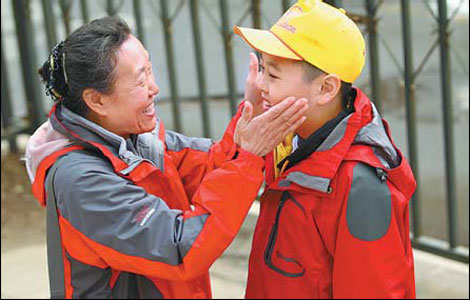Helping them help themselves
Updated: 2013-04-03 05:32
By Liu Zhihua (China Daily)
|
||||||||
|
An autistic boy shares an intimate and happy moment with his teacher in Beijing's Kangnazhou center. |
Wen Hong is very busy these days. The deputy secretary-general of the China Association of Persons with Psychiatric Disability and Their Relatives is busy plotting new ways to help older autistic children.
In 2012, she and four friends, all with autistic children, founded Kangnazhou, a nongovernmental organization that aims to provide care and life skill training to autistic children.
Now the organization is providing weekly baking and basic computer skills training to more than 20 autistic patients aged 12 to 25.
"China has hundreds of institutes for pre-schoolers and school-aged autistic children, but those older than 16 have long been ignored," Wen says.
Since the first official diagnosis of autism in China three decades ago, thousands of autistic children have reached adulthood and their future looks dismal. They can no longer stay in schools or institutes for children, but there are almost no full-time care centers for them.
Most of them have no life skills, and cannot fend for themselves. Even if they are skilled, potential employers are likely to shun them for fear of trouble.
Ji Shengmin, 57, from Beijing, is sad and fearful whenever she thinks of what will happen to her 31-year-old autistic son when his parents are no longer around.
Her son was diagnosed when he was 5. After he dropped out of a special public school for the mentally challenged as a teenager, he has been at home.
For decades, both Ji and her husband sacrificed their careers so they could stay with their son as much as possible. As he grew up, however, his behavior became more disruptive and his temper got worse.
"We are getting older, and he is stronger than we are. Sometimes, he hits us," Ji says. "There are no care centers for the adult autistic, and he cannot fit into society. I dare not think what will happen if he is left alone in the world after his father and I die."
Li Yan, a 29-year-old autism sufferer in Beijing, graduated from a special school when he was 16, and stays at home now. His mother is also very worried about his future.
Both families hope there will be public care centers for their children, especially after the parents die.
"Sixteen to 60 is the most important span of life for an individual, but for autistic people, that is the darkest time currently," Wen says. "Beijing is much better in providing services for the autistic. But even so, there are few centers for grown-ups. They have no future if we don't take some measures."
Well-designed care centers are necessary, and if the autistic receive special skills training, perhaps then they'll get a chance at living on their own, with dignity.
(China Daily 04/03/2013 page19)

 In Photos: 7.0-magnitude quake hits Sichuan
In Photos: 7.0-magnitude quake hits Sichuan
 Li Na on Time cover, makes influential 100 list
Li Na on Time cover, makes influential 100 list
 FBI releases photos of 2 Boston bombings suspects
FBI releases photos of 2 Boston bombings suspects
 World's wackiest hairstyles
World's wackiest hairstyles
 Sandstorms strike Northwest China
Sandstorms strike Northwest China
 Never-seen photos of Madonna on display
Never-seen photos of Madonna on display
 H7N9 outbreak linked to waterfowl migration
H7N9 outbreak linked to waterfowl migration
 Dozens feared dead in Texas plant blast
Dozens feared dead in Texas plant blast
Most Viewed
Editor's Picks

|

|

|

|

|

|
Today's Top News
Live report: 7.0-magnitude quake hits Sichuan, heavy casualties feared
Boston suspect cornered on boat
Cross-talk artist helps to spread the word
'Green' awareness levels drop in Beijing
Palace Museum spruces up
First couple on Time's list of most influential
H7N9 flu transmission studied
Trading channels 'need to broaden'
US Weekly

|

|








